Lenny Wilkens, N.B.A. Hall of Famer as Both Player and Coach, Dies at 88

© Lindsey Wasson/Associated Press

© Lindsey Wasson/Associated Press

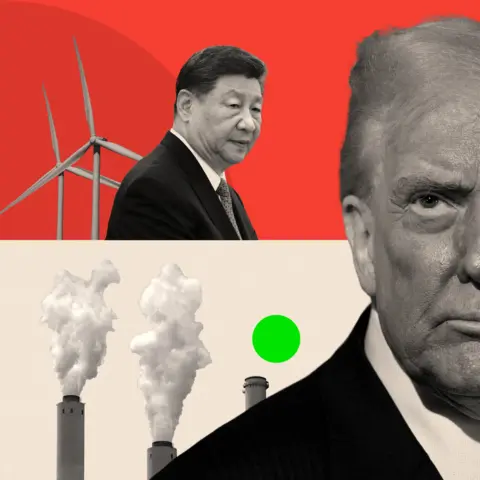 BBC
BBCThere is a photograph, taken ten years ago in Paris, that today seems like something of a relic.
In it, dozens of men and women line up in dark suits, in front of an enormous sign that reads COP21 Paris.
Right in the middle the UK's then-Prime Minister, David Cameron, grins widely, as he stands beside the future King Charles III, just in front of China’s Xi Jinping. Far off to the right is the then US President Barack Obama, deep in conversation with someone who is cut off from the frame - because there were so many leaders lining up that day that it was difficult for the photographer to capture them all at once.

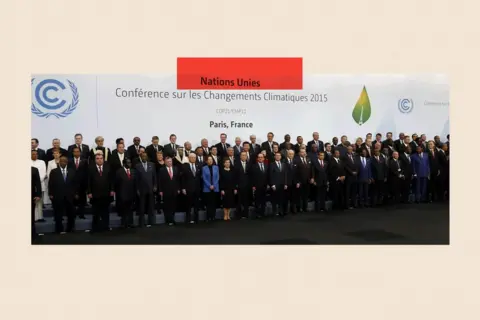 AFP via Getty Images
AFP via Getty ImagesWhat a far cry from the family photograph taken on Thursday with this year's line-up at the COP30 summit in Brazil, with just 30 leaders in the picture.
Xi and Modi were no-shows, along with the leaders of around 160 other countries. And notably absent was the US President Donald Trump.
In fact, the Trump administration has exited the process entirely and has said it will not send any high-level officials this year.
Which raises the question, why have a two-week-long multinational gathering at all if so many leaders aren’t there?
Christiana Figueres, the former head of the UN's climate process under whose leadership the Paris Agreement was struck, said during last year's gathering that the COP process was "not fit for purpose."
"The golden era for multilateral diplomacy is over," agrees Joss Garman, a former climate activist who now heads a new think tank called Loom.

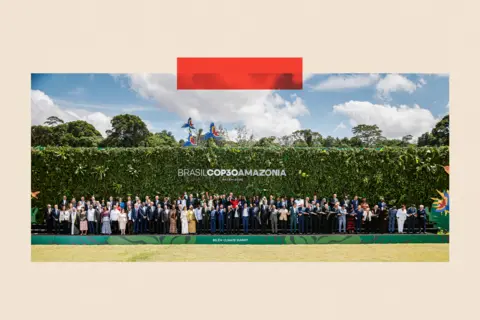 Anadolu via Getty Images
Anadolu via Getty Images"Climate politics is now more than ever about who captures and controls the economic benefits of new energy industries," he tells me.
So, with carbon dioxide emissions still rising even after 29 of these meetings - which are, after all, aimed at bringing them down - will more COPs make any difference?
On his first day back in office, Trump used his trademark marker pen to withdraw the US from the Paris Agreement, the 2015 UN treaty under which nations agreed to work together to try to keep global warming below 1.5°C.
"This 'climate change' - it's the greatest con job ever perpetrated on the world," he told the UN General Assembly in September. "If you don't get away from this green scam, your country is going to fail."
He has rolled back restrictions on oil, gas, and coal, signed billions of dollars of tax breaks for fossil fuel firms, and opened up federal lands for extraction.
Plus Trump and his team have called on governments around the world to abandon their "pathetic" renewable energy programmes and buy US oil and gas - in some cases with the risk of punitive tariffs if they don't. Japan and South Korea as well as Europe have agreed to buy tens of billions of US hydrocarbons.
The objective is clear: Trump says he wants to make the US the "number one energy superpower in the world".
Meanwhile, he has set about dismantling his predecessor Joe Biden's clean energy agenda.

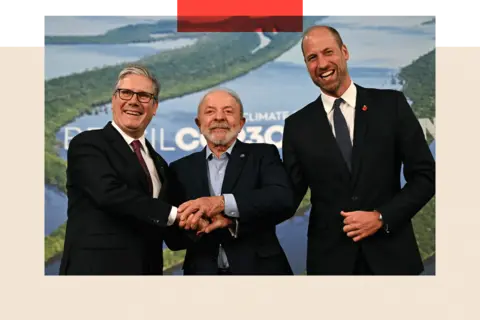 WPA Pool/Getty Images
WPA Pool/Getty ImagesSubsidies and tax breaks for wind and solar have been slashed, permits withdrawn, projects cancelled. Research funding has been cut too.
"Wind power in the United States has been subsidised for 33 years - isn't that enough?" US Energy Secretary Chris Wright said when I asked him to explain the administration's policy when we met in September. "You've got to be able to walk on your own after 25 to 30 years of subsidies."
John Podesta, a senior adviser on climate to both Obama and Biden, sees it differently. "The United States is taking a wrecking ball to clean energy," he argues.
“They're trying to take us back not to the 20th Century, but the 19th."

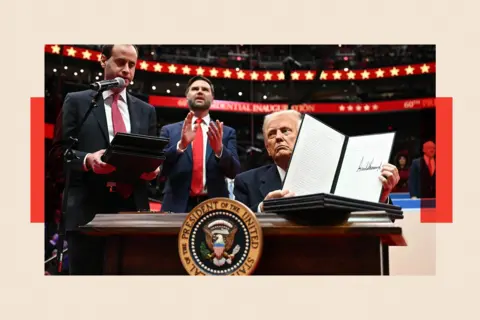 AFP via Getty Images
AFP via Getty ImagesLast month, a landmark deal that would have cut global shipping emissions was abandoned after the US, along with Saudi Arabia, succeeded in ending the talks.
Many supporters of the COP talks are concerned. What happens if the US path leads to other countries dialling down their commitments?
Anna Aberg, a Research Fellow in Chatham House's Environment and Society Centre, describes COP as "taking place in a really difficult political context" given Trump's position.
"I think it's more important than ever that this COP sends some kind of signal to the world that there are still governments and businesses and institutions that are acting on climate change.”
Trump's strategy puts the US on a collision course with China, which has also been working for decades to dominate the world's energy supplies - but through clean technology.
In 2023, clean technologies drove roughly 40% of China's economic growth, according to the climate website Carbon Brief. After a slight slowdown last year, renewables accounted for a quarter of all new growth and now make up more than 10% of the entire economy.
And, like Trump's America, China is engaging internationally well beyond participation in COP - it is taking its entire energy model global.

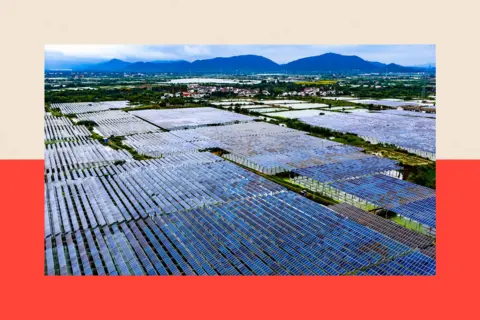 NurPhoto via Getty Images
NurPhoto via Getty ImagesThe split has transformed the climate debate. It is now one that pits the world's two superpowers against each other for control of the most essential industry on Earth.
And it leaves the UK and Europe - as well as major emerging powers like India, Indonesia, Turkey, and Brazil - caught in the middle.
Speaking at this year‘s conference, a source in government at a major developed country said: “Of all the things they're most terrified of, the biggest is being seen to criticise Trump.”
The President of the European Commission, Ursula von der Leyen, warned last month that Europe must not repeat what she termed the mistakes of the past and lose another strategic industry to China.
She called the loss of Europe's solar manufacturing base to cheaper Chinese rivals "a cautionary tale we must not forget".

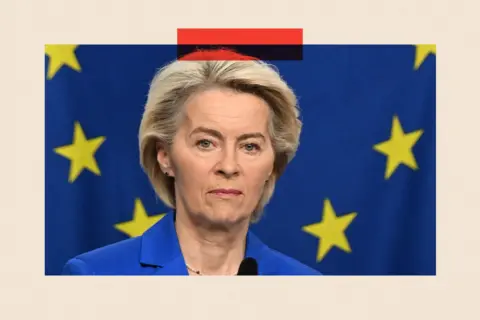 AFP via Getty Images
AFP via Getty ImagesThe European Commission has forecasted that the market for renewables and other clean energy sources will grow from €600bn (£528bn) to €2 trillion (£1.74tn) within a decade and wants Europe to capture at least 15% of that.
But that ambition may come too late.
"China is already the world's clean-tech superpower," says Li Shuo, director of the China Climate Hub at the Asia Policy Institute. Its dominance in solar, wind, EVs, and advanced battery technologies, he says, is now "virtually unassailable”.
He likens it to trying to beat the Chinese national team at table tennis: "If you want to surpass China, you had to get your act together 25 years ago. If you want to do it now, you have no hope."

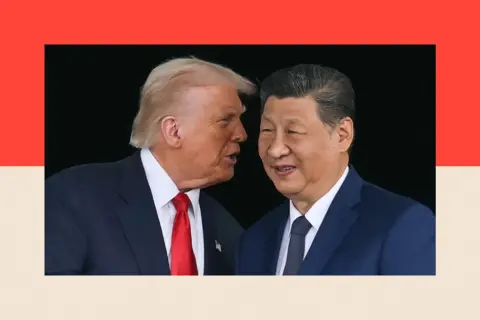 AFP via Getty Images
AFP via Getty ImagesChina produces over 80% of the world's solar panels, a similar share of advanced batteries, 70% of EVs, and more than 60% of wind turbines - all at phenomenally low prices.
The EU's recent move to raise tariffs on Chinese EVs reflects the scale of the dilemma. Open the market and Europe's car industry could collapse; close it and green targets may not be met.
Restricting Chinese access to these markets may slow emissions reductions, says Joss Garman, but he argues, "If we ignore questions about economic security, jobs, national security, that risks undermining public and political support for the entire climate effort."
Now, with these shifts in direction of global politics and priorities, Anna Aberg says she expects COP to become an annual forum for "holding to account" countries and other organisations, something she believes remains an "important role”.
The gathering in Brazil follows the acknowledgement by UN Secretary-General António Guterres that the 1.5°C target set in Paris will be breached - this, he has said, represents "deadly negligence" on the part of the world community.
Last year was the hottest ever recorded, and 60 leading climate scientists said in June that the Earth could breach 1.5°C in as little as three years at current levels of carbon dioxide emissions. Yet more people are questioning the need for an annual gathering.
"I think we need one big COP every five years. And between that, I'm not sure what COP is for," says Michael Liebreich, founder of energy consultancy Bloomberg New Energy Finance and host of a green energy podcast, Cleaning Up.
"You can't just expect politicians to go and make more and more commitments. You need time for industries to develop and for things to happen. You need the real economy to catch up."

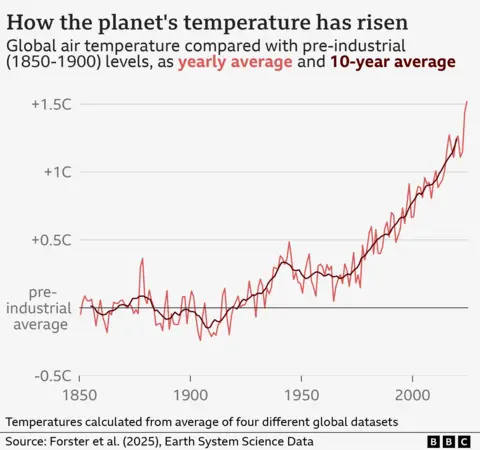
He believes it would be much more productive for the discussions to happen in smaller meetings focused on removing barriers to clean energy.
But he also believes that some issues, like implementation, need to be discussed in places he deems more relevant - like on Wall Street "where people can actually fund stuff” - as opposed to on the edge of the Brazilian rainforest.
Even so, this will be important negotiations at this year's COP. Among other things, it aims to get an agreement for a multi-billion-dollar fund to support the world's rainforests like the Amazon and the Congo Basin.
Michael Jacobs, who advised Gordon Brown on climate policy and is now a politics professor at Sheffield University, believes that continued collective support for the process is crucial.
"It's a big political message, because Donald Trump is trying to undermine the collective process, but it's also a message to businesses that they should continue to invest in decarbonisation because governments will continue to enact climate policies."

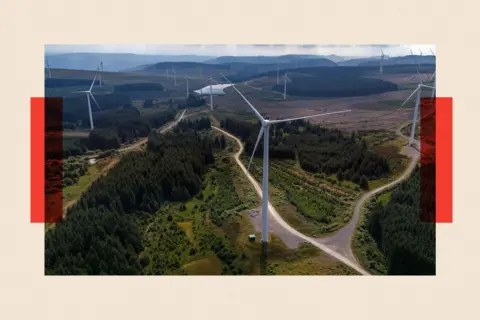 Getty Images
Getty ImagesThe UK's Energy Secretary, Ed Miliband believes these meetings have delivered real progress by getting countries to engage with tackling climate change and enact policies that have made the renewable revolution possible.
"It's dry, it's complicated, it's anguished, it's tiring,” he says - “and it's absolutely necessary”.
Many now do, however, accept there is a strong argument for these international gatherings to be scaled down.
Ultimately, however, the real choice underlying it, for so many nations in attendance, simply comes down to the extent to which they align with a China-led clean energy revolution - or double down on the fossil fuels–first agenda.
Which is why many observers say the process of decarbonisation is going to be less about the multi-country commitments of COPs past, and far more about big-money deals between individual countries as we look ahead to this year’s summit - and how COPs may well play out in the future.
Top picture credit: Getty Images


BBC InDepth is the home on the website and app for the best analysis, with fresh perspectives that challenge assumptions and deep reporting on the biggest issues of the day. You can now sign up for notifications that will alert you whenever an InDepth story is published - click here to find out how.

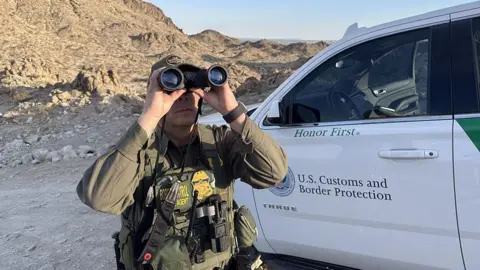 Getty Images
Getty ImagesIn Chicago, Los Angeles and Portland, the immigration debate has spilled into the streets, sparking almost daily demonstrations while immigration agents ramp up arrests.
But in El Paso - a city in Texas on the US-Mexico border - the streets are unusually quiet.
A year after the BBC last visited the border to understand the impact of the migrant crisis on the border, sites that were once teeming with migrants lay largely silent.
Just a few years ago, as many as 2,500 migrants once camped outside the city's historic Sacred Heart Catholic church. Many lined the streets sleeping on donated blankets, idling while they waited for food and water to be distributed by local charities.
Now, only a handful of parishioners can be seen coming in and out of the church.
The same is true of a nearby park and of shelters throughout the city, where migrants once huddled to exchange their experiences of trudging through jungles and deserts or being detained, robbed or nearly kidnapped on their long journeys through Latin America to the border.
The influx prompted El Paso's government to declare a state of emergency in late 2022 as local shelters ballooned beyond capacity.
Then, when US President Donald Trump came into office in January - elected in part because of his promise to fix the border - the regular flow of migrants into El Paso slowed to a trickle.
It is a trend that has repeated itself along the length of the 1,900-mile (3,145km) border, from the Pacific Coast in California toTexas' Gulf coast.
Figures for detentions of border crossers are at a 50-year low.
In September alone - the last month for which complete data is available - 11,647 people were detained along the entirety of the US-Mexico border, compared with 101,000 in September 2024 and 269,700 the same month in 2023.
One volunteer network, Annunciation House, once ran as many as 22 shelters throughout the region, catering in large part to thousands of migrants paroled into the US to await court dates, often years in the future.
There are now only two. The relative trickle of migrants - 15 to 20 in each location on a given night - is composed, in part, of those headed back home after years in the US.
"We have people who entered and were given employment authorisation, or temporary protected status that Trump has taken away, and they can't renew their employment. Then they can't pay rent," Annunciation House director Ruben Garcia told the BBC.
Others, he added, are simply in need of a place to stay while "they can do the logistics" of leaving the country.

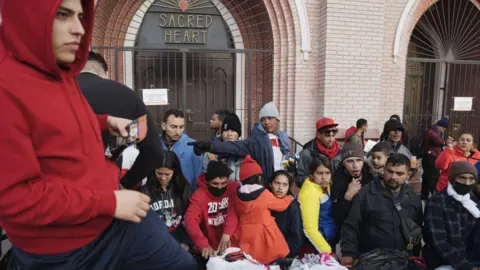 Getty Images
Getty ImagesFor some along the border, the new reality comes as a relief.
Demesio Guerrero, a naturalised US citizen originally from Mexico who lives in eastern Texas, described the border as "chaos everywhere" under the Biden administration.
"There were encampments everywhere along the border, with women, children and old people," he said. "It was totally out of control."
That chaos had now gone, he said, because Trump had a vision for how to fix the problem and did it. "He did what he had to do, where he had to do it."
For six straight months, administration officials say, not a single undocumented migrant who was arrested was released into the US. Many have been deported, while others remain in immigration detention.
Border czar Tom Homan and Homeland Security Secretary Kristi Noem often declare that, for the first time in US history, the government has full "operational control" of the border.
For the White House, the figures represent a victory - fufilling a campaign promise that the president himself has touted as the one that led him back to the White House for a second term at a time when many Americans were concerned that Joe Biden had lost control.
"So far, this strategy has proven to be wildly successful," White House spokesperson Abigail Jackson told the BBC. "We're undoing the pro-illegal immigration policies from the Biden administration that allowed countless illegals into the country. We've secured the border."
The reasons for the low figures - which began falling in Biden's last year in office and rapidly accelerated under Trump - are complex.
Officials and experts point to a range of factors, including a Mexican crackdown on migrant flows north, the end of most humanitarian parole programmes, much tighter asylum restrictions and increased surveillance with the help of the US military.
Trump's deportation drive in the US interior has also served as a deterrent to would-be migrants.
"Not many people are crossing the border, and not that many are even trying," one undocumented immigrant, who asked to remain anonymous, said.
"With Biden, people knew that sooner or later they would be able to come across and stay. It's not like that now."
Some Trump supporters living in El Paso said that at times they feared for their safety, and accused the Biden administration of creating an atmosphere that endangered both local residents and migrants.
"We didn't feel comfortable going out by ourselves anymore," said Lorie Randazzo, a lifelong El Paso resident and the president of Greater El Paso Republican Women. "Almost as soon as Biden hit office, it got bad."
It's not that we don't want the immigrants coming in, she added, but only the best ones, the ones who want to work.
Elizabeth Amy Posada, an El Paso native and a former aide to the local Republican congressman, said there used to be "death everywhere", referring to migrants dying in the desert or in the Rio Grande, and those who fell victim to cartels.
"Everyone should be happy about this [border security], no matter what their political persuasion."
But for others, Trump's border security drive brings mixed feelings.
Many local conservatives are sympathetic to the plight of migrants. Other locals, vehemently opposed to Trump, say they understand the need for stronger border protections and recognise the important role that federal officers play in their communities.
"We absolutely live in the grey area here," said Marisa Limon Garza, the executive director of the Las Americas Immigrant Advocacy Center, an El Paso non-profit that provides free and low-cost legal services to immigrants and refugees.

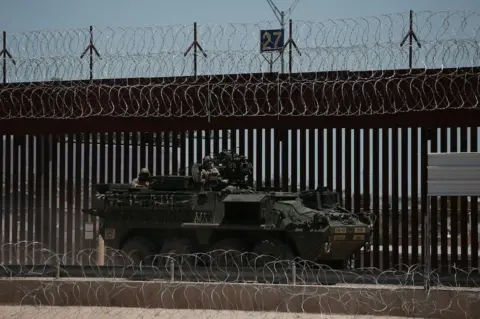 Getty Images
Getty ImagesAccording to Ms Garza, the prospect of long-time residents being removed from the country is particularly galling to border residents, many of whom have family on both sides of the border or come from immigrant families that came to the US generations ago.
While Trump and other officials have repeatedly said that immigration officials are going after "the worst of the worst", data shows that is not the case.
The Transactional Records Access Clearinghouse - which tracks immigration data - found that just over 70% of the nearly 60,000 people held at the end of September had no criminal record. Many have been in the country for years.
"Now what we know to be true is that some people are waking up and realising they got scammed," said Ms Garza, referring to locals who voted for Trump.
"Realising that they screwed their families, their loved ones, and their neighbors… and now have to wrestle with that."
Ross Barrera, a 29-year-veteran of the US Army and a Republican who lives in Rio Grande City, told the BBC that most people in his small border community are broadly in favour of strong border security, given that legal travel and commerce across close-knit US and Mexican towns continues unabated.
But Mr Barrera added that images of harsh immigration enforcement raids across the US "upset a lot of people" and have caused friction.
"That upsets me too," he said. "People are human. It bothers people that the lady who's been here 20 years is getting deported, or the dad who's been here 40 years is getting deported."
Others are more blunt.
"There's a lot of people that are having second thoughts about the way they voted," said Jesse Fuentes, an activist in Eagle Pass, another town that found itself in the middle of America's border battle in mid-2023.
"But people are afraid to say or do anything."

 Family handout
Family handoutWarning: This article contains upsetting details and references to serious self-harm and death
Just four months after a young woman died in a London mental health unit, another patient tried to harm herself in startlingly similar circumstances, leaked documents seen by the BBC show.
Alice Figueiredo, a patient at Goodmayes Hospital, which is run by North East London Mental Health Trust (NELFT), attempted to harm herself using plastic or bin bags on 18 occasions, mostly taking them from the same shared toilet. On the 19th occasion, in July 2015, she managed to take her own life.
Just four months later, in November 2015, another young woman also on Hepworth ward attempted to harm herself using a bin bag. She survived.
Mental health campaigners say it suggests a worrying failure to learn from tragedies.
"It's shocking and distressing that this was still going on four months after Alice died," says Jane Figueiredo, Alice's mother. "The bin bags could and should definitely have been removed, but instead patients continued to be put at unnecessary risk."
NELFT says all bin bags have been removed and "it is committed to learning from every incident and continuously improving" the care it provides.
NELFT and former ward manager Benjamin Aninakwa are due to be sentenced this week after an Old Bailey jury concluded they had not done enough to keep 22-year-old Alice Figueiredo safe.
The BBC has spoken to former NELFT patients, families and ex-staff who have experience of the Trust's community and hospital services over the ten years since Alice's death.
They raise concerns about poor management, record-keeping, risk assessments and staff shortages stretching over that decade.
An email, which gives details of the November 2015 incident, was submitted to an internal inquiry commissioned by the trust after Alice's parents complained about the care she had received.
The inquiry's report, which has been seen by the BBC, has never been made public.

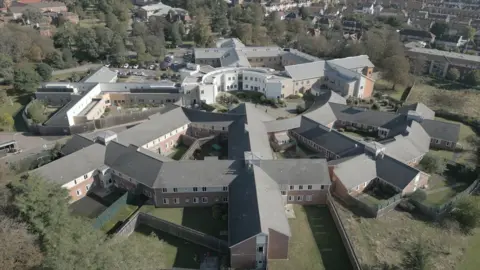
"The similarities between this young woman and [Alice Figueiredo] are startling in terms of presentation, age range, background," the email said.
It goes on to say while it appears there has been "some learning" since Alice's death, there was "significant evidence" that not all incidents were being properly reported.
The hospital used an NHS risk management system called Datix where incidents should be logged on the system to help identify risks and patterns of behaviour.
The report says during the time Alice was on the ward there were 81 incidents or near misses that met the criteria for being reported via Datix, but just 14 (17.2%) were logged on the system.
In the November case, there was also significant under-reporting. The report suggests that of 45 self-harm events involving the unidentified young woman, 27 do not appear on the risk management system, including the attempt to harm herself using a bin bag.
The general lack of recording on the ward meant "opportunities to safely manage patients were missed", the inquiry found.
NELFT says it has removed plastic bags from wards in line with national guidance, and improved record-keeping and case management.
Overall, the internal report paints a picture of a ward where there were very sick patients, staff shortages - particularly of nurses - and a poor relationship between ward manager Benjamin Aninakwa and the consultant psychiatrist.
The report also says 100% of the support workers assigned to observe Alice one to one were temporary staff.
Brian Dow, from the mental health charity Rethink, says the document shows the unit did not act quickly enough after Alice's death to protect other patients.
"Lessons should be learned, and you should not expect to see a repetition of the same risks and the same dangers just weeks afterwards," he said.
"You need to have a culture of openness and transparency so that you can learn from the mistakes."

 Family handout
Family handout"Jenny", not her real name, was a patient on Hepworth ward at the same time as Alice. They became close friends. She says rather than an open and transparent culture on the ward, the atmosphere felt difficult and intimidating to her.
She shared the statement she had made to police investigating Alice's death with the BBC. In it she remembers how Alice helped her cope.
"She used to wake me up every morning on Hepworth ward with a big hug," she says.
She describes how staff meant to be looking after them were often not doing the necessary checks or observations.
"On countless occasions I witnessed Alice asking to speak to members of staff who were supposed to be doing observations on her but were instead busy on their phones," she wrote.
She also told police that observation records detailing what patients had been doing, which are important in giving clinicians a sense of how that person is coping, were often falsified.
Jenny left Goodmayes Hospital before Alice died. She is now living in her own home with support in the community, although she still misses her friend.
The BBC has previously highlighted repeated criticisms of the trust by coroners, with the most recent concerns being raised in May 2025 following the death of a 37-year-old man under the care of NELFT's community-based team.
The most common criticisms are about the poor quality of record-keeping, risk assessments, risk management and care planning. Staff shortages and poor communication are also highlighted in a number of reports over the last decade.
Former staff who have spoken to the BBC have raised similar concerns.
Mark New was a senior support worker in the trust's community mental health team. He says it was a good place to work for most of the 15 years he was there, but things deteriorated to such an extent that he resigned earlier this year.
He says mandatory medical and care management reviews were not always happening, leaving some patients' conditions untreated, and some "were languishing in crisis for weeks… for months".
"All of this was being fed back to staff in charge, but it wasn't really being acknowledged," he says.
The trust operated a traffic light system on patient files to indicate their level of need and the risk they posed to themselves or others. Mr New says these files were often not filled out accurately or updated properly, including risk assessments.
Mr New remembers one client who was flagged green or low risk. He later discovered they had recently been picked up by police following allegations of "assault and hostage-taking with a bladed weapon".
The trust says it is sorry if any staff member felt unsupported or unsafe, and acknowledges that "workforce pressures have historically impacted the quality of care across the NHS." It says it has made substantial investment in recruiting and retaining staff.
"We need a health system that prevents people ending up in crisis," says Brian Dow from Rethink. "Too often we hear stories of people escalating unnecessarily."
Alice Figueiredo's mother, Jane, and stepfather, Max, have spent the last decade seeking justice and transparency over what happened to her.
"We should be able to expect safe, compassionate and diligent care for some of the most vulnerable people in society," says Jane. "Urgent action is needed, not just at NELFT, but in all mental health hospitals, wards and services around the country."
NELFT says it is sorry for Alice's death and it remains "dedicated to ensuring that Alice's memory continues to inspire positive change" and will "continue to work tirelessly to deliver safer, more compassionate care for the communities we serve".
The BBC understands that Benjamin Aninakwa, who still works at NELFT, is appealing against his conviction for failure to take reasonable care for the health and safety of others affected by acts or omissions at work. He was acquitted of gross negligence manslaughter.
If you are suffering distress or despair, details of help and support in the UK are available at BBC Action Line.

韩国媒体报道,在捕蟹旺季期间,在韩国西部海域一带非法捕捞的中国渔船数量较去年大增。
据韩联社报道,韩国中部地方海洋警察厅西海五岛特别警备团星期一(11月10日)发布的数据显示,从韩国梭子蟹捕捞旺季开始的9月到10月,日均有190艘中国渔船在韩国西部海域北方界线一带非法捕捞,较去年9月的日均150多艘以及10月的日均160多艘,增加30艘至40艘。
同期,韩国在西部海域北方界线扣押和驱逐的中国渔船分别有两艘和411艘。
另据中新社报道,中国驻韩国光州总领事馆星期天(11月9日)称,当天上午一艘中国渔船在韩国全罗南道可居岛附近海域倾覆,船上共11人,目前六人获救,两人死亡,三人失踪。中国驻光州总领事馆表示,正密切关注事件进展。
日本首相高市早苗在国会备询时说,如果台湾有事,日本或将面临存亡危机,因此可行使集体自卫权应对。日本前首相鸠山由纪夫对此表示,“日本不应干涉中国内政”。
据日本共同社报道,高市早苗上星期五(11月7日)在众议院预算委员会会议上受询时说,如果台湾遭遇突发事态,伴随着战舰和武力使用,有可能因此危及日本的存亡,因此日本可依据《安全保障相关法》,向未直接攻击日本的一方行使集体自卫权。
鸠山由纪夫上星期六(8日)在X平台发文说,有人曾说过“台湾有事就是日本有事”,但首相高市早苗提到,日本若面临存亡危机可能行使集体自卫权。
鸠山由纪夫称,这么做或是为了煽动助长危机,并借此扩张军力,但强调:“日本一直尊重‘台湾是中国的一部分’。台湾问题是中国内政,日本不应该介入。”
另据产经新闻报道,另一日本前首相、立宪民主党党魁野田佳彦上星期六受访时说,高市的言论让他“深感震惊”,“我感觉到她独自贸然行动的危险性”。
野田佳彦表透露,他将在星期一(10日)起的国会审议中追问此事。
野田佳彦指出,“这是历代首相都在一定程度上止步的话题。(高市的发言)会给国内外造成影响”。他认为,高市的发言影响重大,并称“必须格外谨慎”。
中国全国人大常委会副委员长李鸿忠在星期一(11月10日)出版的中共中央机关报《人民日报》上撰文称,中国式现代化从根本上讲是中国共产党领导的社会主义现代化,中共的领导直接关系中国式现代化的根本方向、前途命运、最终成败。没有中共,中华民族不可能实现从站起来、富起来到强起来的伟大飞跃,中国不可能走上现代化之路。
这篇题为《推进社会主义民主法治建设(学习贯彻党的二十届四中全会精神)》的文章首先提到,中共二十届四中全会通过的《中共中央关于制定国民经济和社会发展第十五个五年规划的建议》(简称《建议》),全面贯彻习近平新时代中国特色社会主义思想,围绕新时代新征程党的中心任务,坚持以推动高质量发展为主题,全面擘画未来五年中国经济社会发展的宏伟蓝图。
文章继说,《建议》部署了推进社会主义民主法治建设的重大任务,对于巩固和扩大中国特色社会主义制度优势,充分调动全体人民投身中国式现代化建设的积极性主动性创造性,确保基本实现社会主义现代化取得决定性进展,具有重要意义。
文章称,中共十八大以来,以中共总书记习近平为核心的党中央立足坚持和完善中国特色社会主义制度、推进国家治理体系和治理能力现代化,推动中国社会主义民主法治建设取得历史性成就。习近平原创性提出全过程人民民主重大理念,丰富和发展了马克思主义国家学说和社会主义民主政治理论,为新时代社会主义民主政治建设指明了方向、提供了遵循。
文章提到,中国特色社会主义政治发展道路,是近代以来中国人民长期奋斗历史逻辑、理论逻辑、实践逻辑的必然结果,是团结亿万人民共同奋斗的正确道路。坚持走中国特色社会主义政治发展道路,关键是要坚持中共的领导、人民当家作主、依法治国有机统一,核心是坚持中共的领导。中共的领导是人民当家作主和依法治国的根本保证,人民当家作主是社会主义民主政治的本质特征,依法治国是中共领导人民治理国家的基本方式。
文章写道,要坚持中共对民主法治建设的全面领导,始终把牢正确政治方向。中国式现代化从根本上讲是中共领导的社会主义现代化,中共的领导直接关系中国式现代化的根本方向、前途命运、最终成败。没有中共,中华民族不可能实现从站起来、富起来到强起来的伟大飞跃,中国不可能走上现代化之路。在中国政治生活中,中共居于领导地位,在中共中央集中统一领导下,人大、政府、政协和监委、法院、检察院依法依章程履行职能、开展工作,保证国家统一高效组织推进各项事业,充分发挥社会主义制度集中力量办大事的优势。
文章也说,推进社会主义民主法治建设,首要的是把牢正确政治方向,毫不动摇坚持中共的全面领导特别是中共中央集中统一领导,把中共的领导贯穿党和国家事业发展各方面全过程,确保中共的领导地位和执政地位不断巩固,确保中共对国家和社会的领导不断加强,始终成为中国式现代化的坚强领导核心。
文章最后写道,要坚持以习近平新时代中国特色社会主义思想为指导,深刻领悟“两个确立”的决定性意义,增强“四个意识”、坚定“四个自信”、做到“两个维护”,在中共中央领导下深入推进社会主义民主法治建设。
台风“凤凰”和冷空气共同影响福建,两条小三通客运航线停航。
据中新社报道,福建省气象台星期天(11月9日)发布海上大风预警Ⅲ级称,受今年台风“凤凰”和冷空气共同影响,11月10日至14日,福建沿海海区和渔场将持续出现平均风力8级以上大风。
台风“凤凰”已于星期天凌晨加强为超强台风级,下午2时台风中心距离菲律宾马尼拉偏东方向约275公里。
据福建省气象台预计,“凤凰”星期一(10日)傍晚前后进入福建省台风警戒区,星期二(11日)开始逐渐转向北偏东方向移动,可能于星期三(12日)白天在台湾岛西南部沿海登陆,之后强度迅速减弱。
福州港客运站通报称,福州马尾至马祖“小三通”客运航线星期一双向停航;11月10日至12日,福州黄岐至马祖“小三通”客运航线双向停航。

 BBC
BBCTim Davie has resigned as the director general of the BBC following criticism that a Panorama documentary misled viewers by editing a speech by US President Donald Trump.
Deborah Turness, the corporation's head of News, has also stepped down from her role over the issue.
Davie had held the top job for five years, but had recently faced increasing pressure over a series of missteps and allegations of bias.
The Telegraph published details of a leaked internal BBC memo on Monday that suggested the Panorama programme edited two parts of Trump's speech together so he appeared to explicitly encourage the Capitol Hill riots of January 2021.
This breaking news story is being updated and more details will be published shortly. Please refresh the page for the fullest version.
You can receive Breaking News on a smartphone or tablet via the BBC News App. You can also follow @BBCBreaking on X to get the latest alerts.

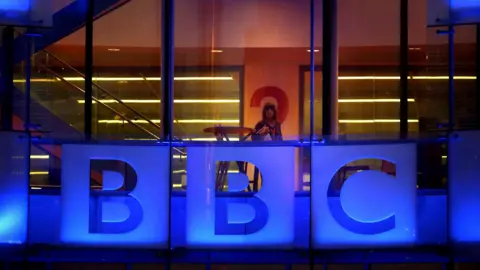 Getty Images
Getty ImagesThis is seismic. To lose both the director general and the CEO of BBC News at the same time is unprecedented. It's an extraordinary moment in the history of the BBC.
It can't be underestimated.
On the face of it, Tim Davie's resignation makes some sense.
I have wondered for some time whether he was weighing up how much longer he wanted to stay in a job that is highly pressurised.
There have been occasions when I have interviewed him this year, as the controversies mounted, and he didn't seem his usual Tigger-ish self.
In his resignation statement he referenced "the very intense personal and professional demands of managing this role over many years in these febrile times".
My assessment is that the latest controversy felt one too many after a succession of crises (two Gaza documentaries, the Bob Vylan Glastonbury issue amongst them) and he didn't have enough oil in the tank for another fight.
As former head of BBC comms, John Shield put it to me "the DG job is one of the hardest in public life".
"It has been relentless for him. He is a very capable leader who has driven real change, but at some point it becomes unsustainably attritional."
I'm told there was still real shock when Tim Davie shared his decision with colleagues over the weekend.
Deborah Turness' statement makes clear she has resigned on a point of principle. With the ongoing controversy around the President Trump Panorama causing damage to the BBC, she said "the buck stops with me - and I took the decision to offer my resignation to the director general last night".
But, as with any resignation, and certainly with two, I can't help thinking there is more to this than meets the eye. And there is another story emerging about the functionality and make up of the BBC Board and its role in what has happened.
It appears there has been a rift between the Board and the news division with some arguing the BBC has, for too long, failed to address institutional bias inside the BBC and others questioning whether what's unfolded has been an orchestrated - and politicised - campaign against the corporation which has claimed two big scalps.
For the best part of a week, since the Telegraph first broke its story, I haven't been able to understand why the BBC did not get on the front foot in the face of a deluge of damaging headlines about claims of systemic bias.
It needed to divide the allegations into two distinct stories.
The first, about the edit of the Trump speech in the Panorama programme, needed addressing immediately. Either with a swift apology - or indeed a case made for why the BBC believed it had not mischaracterised the president's words.
That would have allowed the BBC to come out fighting more widely on behalf of its journalism. Remember, it was being accused of institutional bias. Of a lack of impartiality. Accusations that cut to the heart of its news operation.
With an apology for the mistake around the Panorama (or a robust defence), it could have gone on to try to refute the other claims about institutional bias.
It could have said that the BBC had already been taking action to ensure editorial impartiality, and had already acted, for example, on issues at BBC Arabic.
Instead the BBC allowed the story to fester - and we ended up in a situation where the Trump White House was calling the BBC "fake news" and it had some traction.
My understanding from multiple sources inside the BBC is that a statement on Panorama had been ready to go for days.
The BBC planned to say on the Trump edit that it hadn't intended to mislead the public, but that in light of looking at it again, it believed there should have been some kind of white flash or wipe, to make clear to audiences that these were two distinct parts of the speech.
I understand Deborah Turness became more and more angry and frustrated as the week went on because she was prevented by the Board from putting out that apology.
Instead the BBC Board decided a letter to the Culture Media and Sport Committee was the way to go.


Many, both inside and outside the BBC, see the failure to respond as a grave mistake. The Telegraph's drip feed of allegations was damaging - and the BBC wasn't tackling them head on.
I have been told that Turness then went into a board meeting on Thursday to discuss the crisis around the Telegraph stories and was "ripped apart", as some have described it.
Those who have called the BBC's journalism into question would call that accountability.
But another source characterised it as the culmination of a "relentless critique of BBC journalism over two years by members of the Board and advisers - all of whom come from same political persuasion".
They point to Robbie Gibb, a former BBC editor who left to become Downing St director of communications for Theresa May and who is now a member of the Board.
The former Sun editor, now BBC presenter David Yelland has called it "nothing short of a coup". He claims the BBC Board has been undermined and "elements close to it have worked with hostile newspaper editors, a former PM and enemies of public service broadcasting".
But another former Sun editor, Kelvin MacKenzie, had a very different take. Speaking on the BBC News Channel, he said the resignations were "the right thing to do - this was an issue that was never going away".
The editing of the speech, he said, could have led to Trump suing or the BBC being banned from the White House. "If you can't be trusted on that [the speech of the US president] what can you be trusted on?" he said.
And the US president himself has weighed into the debate for the first time. In a post on his Truth Social platform, he celebrated the resignations and accused the BBC of "doctoring" his speech and "trying to step on the scales of a presidential election".
I'm struck by a line in Tim Davie's statement. He said this about the BBC: "We should champion it, not weaponise it."
Tonight, some are asking whether the resignations of both the director general and the CEO of News suggests the BBC has been weaponised.
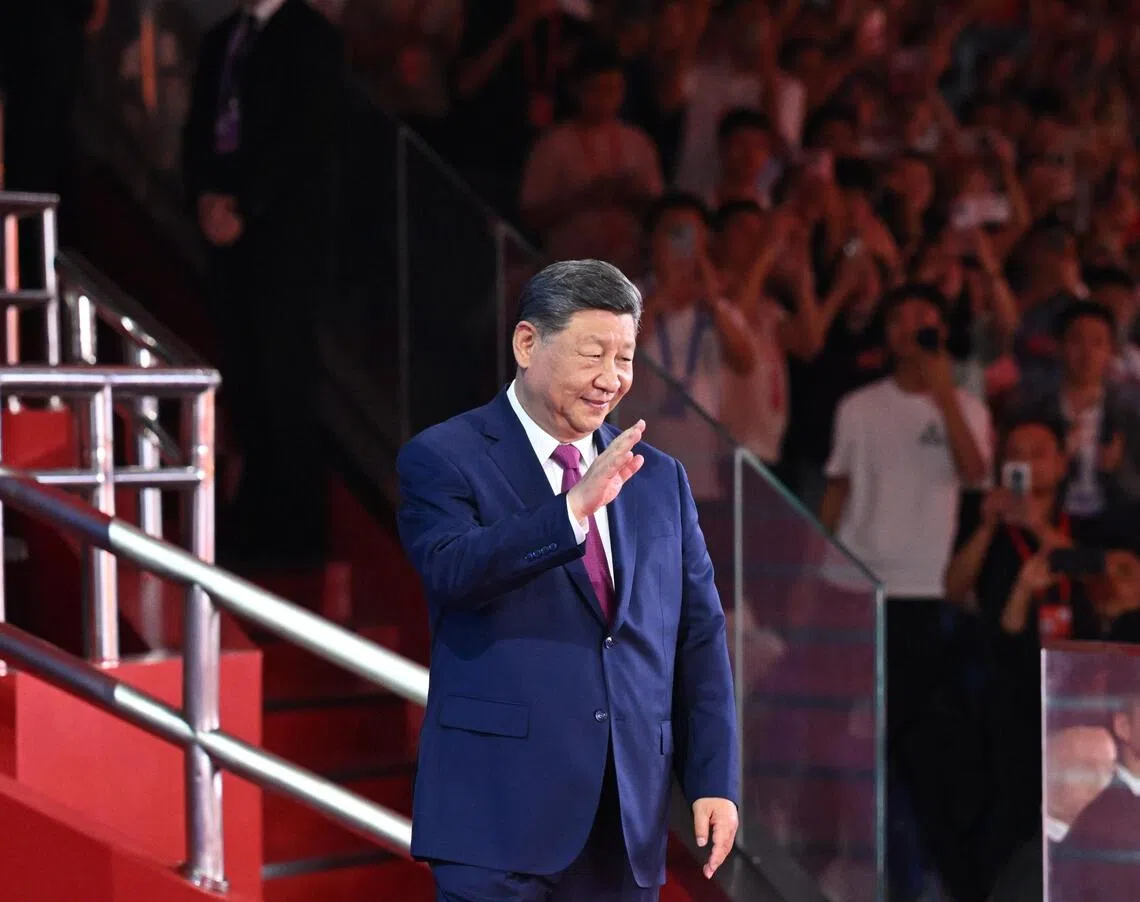
中华人民共和国第十五届运动会(全国运动会)星期天(11月9日)晚间在广东广州开幕。中共总书记、中国国家主席习近平出席开幕式并宣布运动会开幕。
据央视新闻报道,这是首次由粤港澳三地联合举办的全国运动会。习近平和夫人彭丽媛等晚上7时58分步入主席台,向观众挥手致意。全运会开幕式晚上8时正式开始。
中共中央政治局委员、广东省委书记黄坤明,香港特别行政区行政长官李家超,澳门特别行政区行政长官岑浩辉,国家体育总局局长高志丹分别致辞。习近平在晚上8时43分宣布全国运动会开幕。
《明报》报道,广东田径选手苏炳添、香港剑手张家朗与澳门长拳运动员李祎共同点燃火炬。
国际奥委会主席考文垂、国际奥委会终身名誉主席巴赫以及应邀观摩第十五届全运会的境外来宾出席开幕式。
第十五届全运会将于11月21日闭幕,共有1万4000多名运动员参加竞技比赛项目,约1万1000名群众运动员参加群众赛事活动。
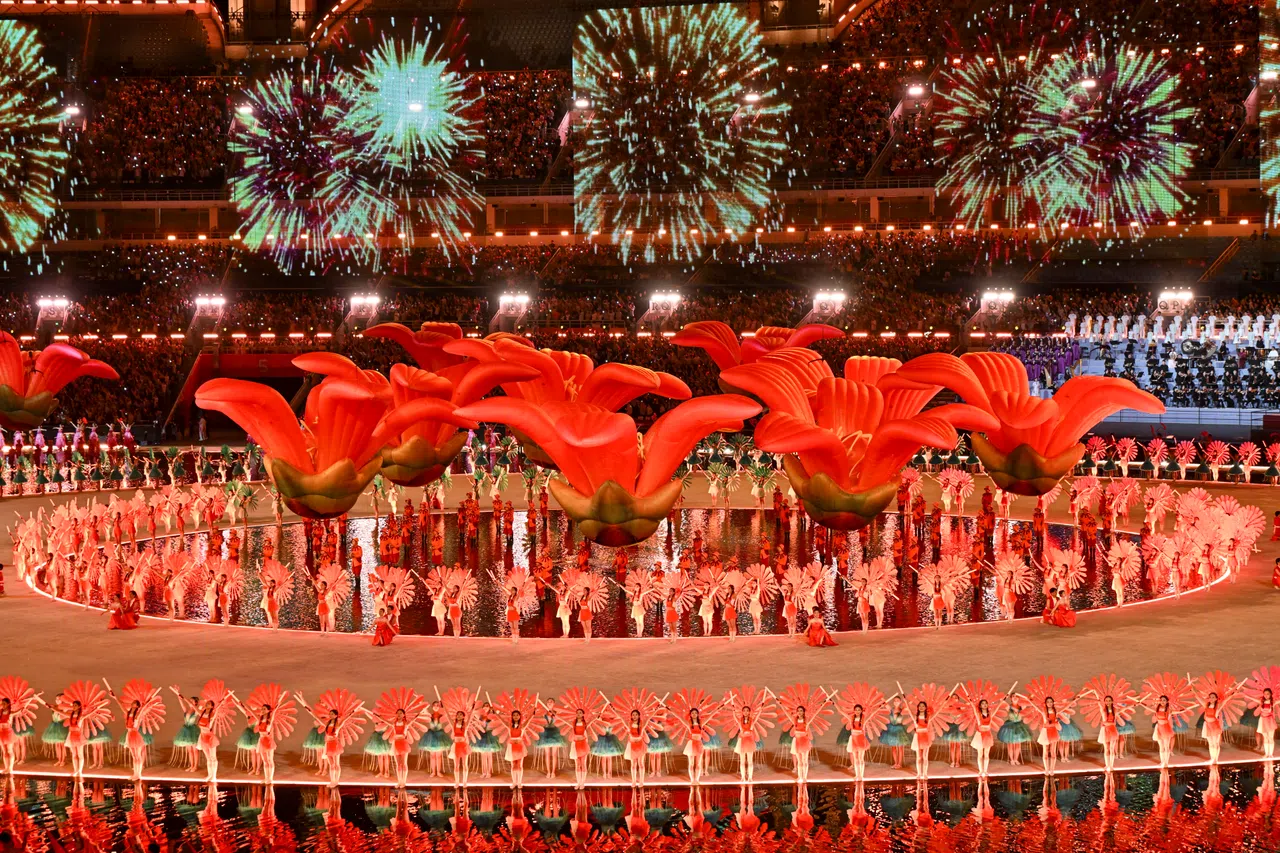


© Marco Postigo Storel for The New York Times


© Andrew Leyden for The New York Times

© Rita Harper for The New York Times

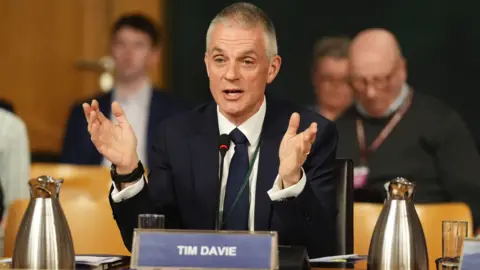 PA Media
PA MediaBBC director general Tim Davie and his head of news, Deborah Turness, have resigned.
The BBC had come under fire over a Panorama documentary that was accused of misleadingly editing a speech by Donald Trump to make it look like he was urging people to attack the US Capitol.
In emails to staff, both Davie and Turness said mistakes had been made.
Tim Davie was appointed director general of the BBC in September 2020. He was in charge of overseeing the corporation's services and was its editorial, operational and creative leader.
He was not a new figure to the BBC; prior to becoming director general, he had been chief executive of BBC Studios for seven years.
Before joining the BBC, Davie worked for organisations such as Procter and Gamble, and PepsiCo.
Deborah Turness had been the CEO of BBC News since 2022, overseeing BBC News and current affairs programmes
In her role, she had responsibility for a team of around 6,000 people, broadcasting to almost half a billion people across the world in more than 40 languages.
She was previously CEO of ITN and was president of NBC News from 2013.
Their departures come after controversy over a Panorama documentary called Trump: A Second Chance?, which was broadcast last year.
In her statement, Turness said: "The ongoing controversy around the Panorama on President Trump has reached a stage where it is causing damage to the BBC – an institution that I love.
"As the CEO of BBC News and Current Affairs, the buck stops with me - and I took the decision to offer my resignation to the director general last night."
She added: "While mistakes have been made, I want to be absolutely clear recent allegations that BBC News is institutionally biased are wrong."
Davie did not mention the Panorama documentary in his statement, although said: "While not being the only reason, the current debate around BBC News has understandably contributed to my decision.
"Overall the BBC is delivering well, but there have been some mistakes made and as director general I have to take ultimate responsibility."
Last week, the Daily Telegraph published an exclusive report, saying it had seen a leaked internal BBC memo.
The memo came from Michael Prescott, a former independent external adviser to the broadcaster's editorial standards committee. He left the role in June.
The memo suggested that the one-hour Panorama documentary had edited parts of Trump's speech together so he appeared to explicitly encourage the Capitol Hill riots of January 2021.
In his speech in Washington DC on 6 January 2021, Trump said: "We're going to walk down to the Capitol, and we're going to cheer on our brave senators and congressmen and women."
However, in the Panorama edit he was shown saying: "We're going to walk down to the Capitol... and I'll be there with you. And we fight. We fight like hell."
The two sections of the speech that were edited together were more than 50 minutes apart.
The "fight like hell" comment was taken from a section where Trump discussed how "corrupt" US elections were. In total, he used the words "fight" or "fighting" 20 times in the speech.
According to the Telegraph, the document said Panorama's "distortion of the day's events" would leave viewers asking: "Why should the BBC be trusted, and where will this all end?"
When the issue was raised with managers, the memo continued, they "refused to accept there had been a breach of standards".
The BBC has come under scrutiny over a number of other different issues in recent weeks.
The Telegraph also reported that Mr Prescott raised concerns about a lack of action to address "systemic problems" of anti-Israel bias in the coverage of the Gaza war by the BBC Arabic news service.
The report also said Mr Prescott had raised concerns about the BBC's coverage around trans issues.
And on Thursday, the BBC upheld 20 impartiality complaints over the way presenter Martine Croxall earlier this year altered a script she was reading live on the BBC News Channel, which referred to "pregnant people".
Tim Davie has weathered many scandals and crises during his five years at the helm of the BBC - including the Gary Lineker furore, Bob Vylan at Glastonbury, the Gaza: How To Survive A Warzone documentary, and the transgressions of a string of high-profile presenters.
Davie was nicknamed "Teflon Tim" by some in the media because nothing seemed to stick.
He had tried to ride out the latest controversy, too, but it has gathered steam and the BBC was expected to issue an apology tomorrow over the Panorama documentary.
This comes at a sensitive time for the BBC, with the government set to review the corporation's Royal Charter - which essentially gives it the right to exist - before the current term expires in 2027.
In his statement, Davie said: "You will ask why now, why this moment?"
He said he was "BBC through and through", and cares deeply about the corporation and wants it to succeed.
"That is why I want to create the best conditions and space for a new DG to come in and positively shape the next Royal Charter. I hope that as we move forward, a sensible, calm and rational public conversation can take place about the next chapter of the BBC."
He added: "This timing allows a new DG to help shape the next Charter. I believe we are in a strong position to deliver growth."
The director general is appointed by the BBC Board, which is responsible for ensuring it delivers the corporation's mission and public purposes.
The BBC Board is led by chair Samir Shah and he is one of 10 non-executive members, plus four executive members, including the director general.
When Tim Davie was appointed in 2020, the process for choosing who would get the role was led by the BBC Board's nominations committee.
The director general's appointment is made under the terms of the BBC's Charter.

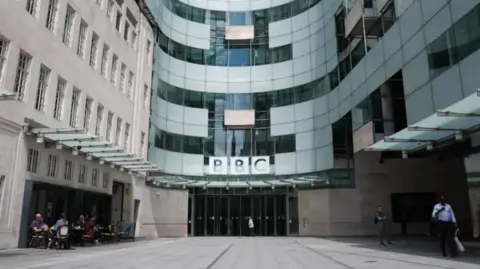 PA Media
PA MediaBBC director general Tim Davie and CEO of News Deborah Turness have resigned, after a newspaper report suggested a BBC Panorama documentary misled viewers by editing a speech by US President Donald Trump.
They announced their resignations in separate emails to all BBC staff, at 18:00.
The BBC's chair Samir Shah also released a statement.
Here are their statements in full:

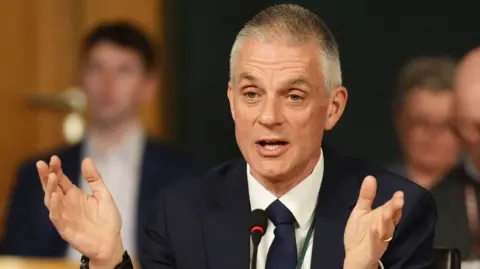 PA Media
PA MediaDear all
I wanted to let you know that I have decided to leave the BBC after 20 years. This is entirely my decision, and I remain very thankful to the chair and board for their unswerving and unanimous support throughout my entire tenure including during recent days.
I am working through exact timings with the Board to allow for an orderly transition to a successor over the coming months.
I have been reflecting on the very intense personal and professional demands of managing this role over many years in these febrile times, combined with the fact that I want to give a successor time to help shape the Charter plans they will be delivering.
In these increasingly polarised times, the BBC is of unique value and speaks to the very best of us. It helps make the UK a special place; overwhelmingly kind, tolerant and curious. Like all public organisations, the BBC is not perfect, and we must always be open, transparent and accountable. While not being the only reason, the current debate around BBC News has understandably contributed to my decision. Overall the BBC is delivering well, but there have been some mistakes made and as director general I have to take ultimate responsibility.
Our organisation is a critical ingredient of a healthy society, as well as a thriving creative sector. We should champion it, not weaponise it.
Despite a hugely competitive market, I am proud that the BBC remains the most trusted news brand globally. We have continued to ensure that it is used by almost everyone in the UK as well as hundreds of millions of people globally. Despite the inevitable issues and challenges, our journalism and quality content continues to be admired as a gold standard. Our transition to a digital organisation has been deeply impressive, and our thriving commercial businesses are admired globally. Also, our work together on ensuring that we have the right culture has been important and motivating. I could not be more impressed by what you are achieving.
You will ask why now, why this moment?
I am BBC through and through, having spent the last 20 years of my life working for this organisation as director of marketing, communications and audiences, director of audio and music, acting director general and chief executive of BBC Studios. I care deeply about it and want it to succeed. That is why I want to create the best conditions and space for a new DG to come in and positively shape the next Royal Charter. I hope that as we move forward, a sensible, calm and rational public conversation can take place about the next chapter of the BBC.
This timing allows a new DG to help shape the next charter. I believe we are in a strong position to deliver growth.
Thank you again, it has been a wonderful ride, which I have loved. I count myself very lucky to have served as DG no.17. I will have a proper chance to see many of you before I go but I have been incredibly proud to lead the BBC as DG for over five years. It is a precious UK institution and you are a world-class team. Thank you all for the tireless support and friendship.
I will always be a passionate cheerleader for civilised society, a strong BBC and a thriving UK.
Best wishes,
Tim

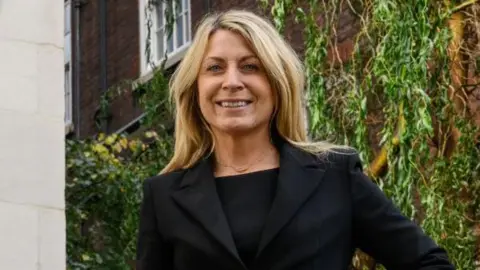 Getty Images
Getty ImagesDear all,
I have never been more proud of the work that you do every day. You really are the best of the best.
I have taken the difficult decision that it will no longer be my role to lead you in the collective vision that we all have: to pursue the truth with no agenda.
The ongoing controversy around the Panorama on President Trump has reached a stage where it is causing damage to the BBC – an institution that I love.
As the CEO of BBC News and Current Affairs, the buck stops with me - and I took the decision to offer my resignation to the Director-General last night.
In public life leaders need to be fully accountable, and that is why I am stepping down. While mistakes have been made, I want to be absolutely clear recent allegations that BBC News is institutionally biased are wrong.
In a polarised world, BBC News journalism is more vital than ever, and I could not be prouder of the work that you do. Together we have bucked the global trend, to grow trust in BBC News, and I want to thank you, wherever you are in the world, for your courageous work to deliver that.
My plea to you: please keep the courage to continue our mission. I'm only sorry that I won't be there to lead and champion your brilliant journalism.
It has been a great privilege to work with you all.
I will now work with Tim to plan an orderly handover to ensure that my decision to step away causes the least disruption possible to the important work that you do.
With very best wishes,
Deborah

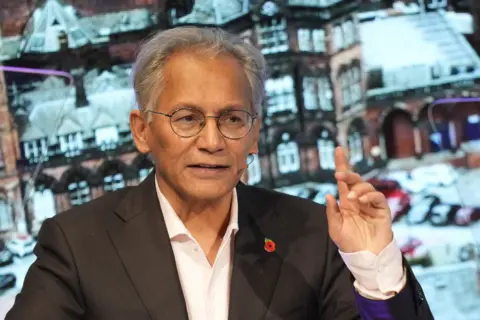 PA Media
PA MediaDear all,
I write to you all on a very difficult day, following the news that our director general Tim Davie will be stepping down. The CEO of News Deborah Turness has also resigned.
On behalf of the BBC Board I want to extend my sincere gratitude to both of them for their unwavering service and commitment to the BBC.
This is a sad day for the BBC. Tim has been an outstanding director general for the last five years. He has propelled the BBC forward with determination, single-mindedness and foresight.
He has had the full support of me and the board throughout. However, I understand the continued pressure on him, personally and professionally, which has led him to take this decision today. The whole board respects the decision and the reasons for it.
Tim has given 20 years of his life to the BBC. He is a devoted and inspirational leader and an absolute believer in the BBC and public service broadcasting. He has achieved a great deal. Foremost, under his tenure, the transformation of the BBC to meet the challenges in a world of unprecedented change and competition is well underway.
Personally, I will miss his stamina, good humour and resilience and I will miss working with him. I wish him and his family the very best for the future.
I also want to thank Deborah for her leadership of BBC News over the past three years. She has transformed the operation of News with real commitment and a clear vision of the future.
She has acted with integrity in challenging circumstances and leaves a strong legacy from which to build for the many millions around the world who rely on and trust the voice of BBC News every day.
Tim has also asked me to pass on the following words in relation to Deborah's resignation. He says: "In the past three years, Deborah has led the newsroom with extraordinary energy, changing the way that it works and cementing BBC News as the most used and trusted news outlet in the UK and the most trusted news provider internationally.
"She has been a valued colleague and a passionate advocate for her team of more than 5,000 people who work round the clock and around the world, on and off air, to report without fear or favour in an age where press freedom has never been under greater pressure. Deborah offered her resignation to me last night, and I want to thank her for all that she has done and to wish her the very best for her future."
I fully understand this has been a difficult period for everyone connected to the BBC and it goes without saying this is an incredibly important time for the organisation.
On behalf of the board, I want to assure you all that we will do everything we can to ensure a smooth transition as we appoint Tim's successor. We will continue to work with Tim in this interim period.
In terms of News, Deborah has agreed to support the organisation to work through an orderly handover.
I fully understand this is unsettling for all of us, but I remain resolute that the BBC will continue to deliver world class public service broadcasting in the days, weeks and months ahead.
I will be back in touch to update you all as soon as possible.
Thank you,
Samir Shah
Tim Davie's resignation as the BBC's top boss brings to an end his 20-year career at the corporation.
He stepped down on Sunday after saying "mistakes were made" following criticism a Panorama documentary misled viewers by editing a speech by US President Donald Trump.
The 58-year-old reached the top of the organisation in June 2020, when he was named the BBC's 17th director general.
At the time of his appointment, he said: "I have a deep commitment to content of the highest quality and impartiality," and when he took the helm, said one of his top priorities would include negotiating with the government over the future of the licence fee.
One of the BBC's longest-serving executives, he first joined the broadcaster from Pepsi to become director of the Marketing, Communications & Audiences division in 2005.

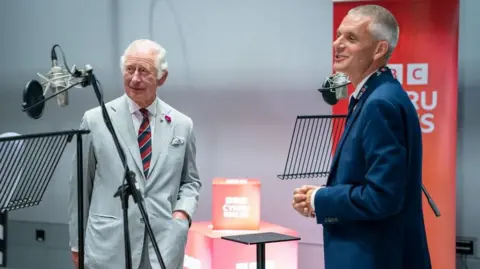
He then took over responsibility for radio stations including Radios 1, 2, 3 and 4 as director of the Audio & Music division in 2008.
A month after being named chief executive of the corporation's commercial arm BBC Worldwide in 2012, he stepped in to become acting director general after the resignation of George Entwistle.
Davie returned to BBC Worldwide after Tony Hall was appointed as George Entwistle's permanent successor, with Davie overseeng the merger of BBC Worldwide with the BBC's production arm to form BBC Studios in 2018.
After landing one of the most high-profile jobs in Britain - and globally - his tenure as director general saw huge challenges.
Former BBC media editor Amol Rajan described the job as "hellish" when Davie first took over.
And while Davie has won praise for successfully overseeing the BBC's move towards digital, putting measures in place to change its workplace culture and focusing on boosting the BBC's commercial success, overall, it's not been an easy ride.
In 2024, the disgraced BBC News presenter Huw Edwards was given a six-month prison sentence, suspended for two years, after he admitted charges of making indecent images of children.
Davie told the press in September last year that there was "shock" and "a lot of upset" within the BBC over Edwards, who had been the BBC's highest-paid journalist.
There was also controversy over comments made online by former Match of the Day host Gary Lineker.
Lineker left the BBC sooner than planned in May 2025 after sharing a social media post about Zionism that included an illustration of a rat, historically used as an antisemitic insult.
Davie said at the time of Lineker's exit that the former footballer had "acknowledged the mistake made" but thanked the presenter and former footballer for "his passion and knowledge" in sports journalism.
Further scrutiny over his leadership came over the summer, as more unwelcome headlines dogged the corporation.
There was a crisis at BBC flagship series MasterChef, after both of its presenters - Gregg Wallace and John Torode - were sacked following a report which upheld allegations against them..
Asked about poor workplace culture as he faced questions from the the Culture, Media and Sport Committee, Davie said he thought "we're at a moment in society where we're calling it out".
Davie added he was "not letting anything lie" when it came to rooting out abuses of power within the corporation
The spotlight also fell on Saturday night stalwart Strictly Come Dancing, with Davie apologising to contestants after complaints of abusive behaviour on the show.
The BBC has also faced strong criticism for a live broadcast of Bob Vylan's performance at the Glastonbury festival, during which the band's singer led crowds in chants of "death, death to the IDF [Israel Defence Forces]" and made other derogatory comments.
Davie said that what had happened was "deeply disturbing", adding: "The BBC made a very significant mistake broadcasting that."
He said that he had done the "right thing" at the time, by pulling it off the iPlayer and that the measures which have since been put in place would "categorically prevent what happened".
Davie also said he thought the corporation made the "right decision" to not air Gaza: Doctors Under Attack, a controversial documentary which was later picked up by Channel 4.
The BBC shelved the programme due to impartiality concerns it had surrounding the production.
Earlier in the year, a separate documentary, Gaza: How To Survive A Warzone, was pulled from iPlayer after it was found that the narrator was the son of a Hamas official.
The film, made by independent production company HOYO Films, was later found by a review to have breached editorial guidelines on accuracy.
The BBC board also had to apologise over "missed opportunities" to tackle "bullying and misogynistic behaviour" by former BBC Radio 1 DJ Tim Westwood.
An independent report into what the BBC knew about Mr Westwood's conduct was published in February, highlighting a series of incidents and allegations it said amount to a "considerable body of evidence" which it failed to investigate properly.
Westwood, who has always denied claims of misconduct, has since been charged with four counts of rape.
Davie's tenure also included overseeing cuts to BBC local services which he defended as being "the right thing", but admitted were "very difficult and unpopular".
He's also had to deal with issues surrounding equal pay at the BBC.
It was only six months ago, in a speech to civic and community leaders in Salford, that Davie insisted the BBC could help tackle a "crisis of trust" in British society.
He set out measures he said would allow the broadcaster to play a leading role in reversing a breakdown in trust in information and institutions, as well as tackling division and disconnection between people.
But in his resignation letter on Sunday, Davie said "the BBC is delivering well but there have been some mistakes made and as director general I have to take ultimate responsibility".
BBC chairman Samir Shah described Davie as "a devoted and inspirational leader and an absolute believer in the BBC and public service broadcasting".
"He has achieved a great deal," Shah added. "Foremost, under his tenure, the transformation of the BBC to meet the challenges in a world of unprecedented change and competition is well under way."

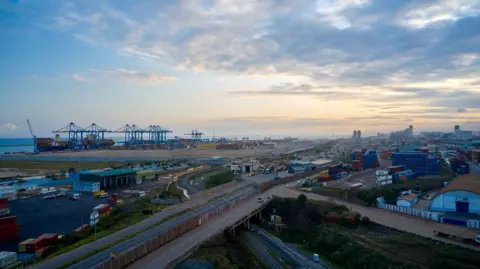 Getty Images
Getty ImagesA British man has died after being shot during a robbery in Ghana on Friday, police say.
Ashraf Qarmar Parvez, 68, was shot after he tried to stop an attempt to steal his phone at a drinking spot in Tema, a city to the east of the Ghanaian capital, Accra. He later died in hospital, police said.
Authorities in Ghana are searching for the shooter - one of a group of six suspects who they say were at the scene and fled on motorbikes.
The BBC has contacted the UK Foreign Office for comment.
A 9mm spent bullet shell was recovered from the shooting site and police have interviewed witnesses as part of their investigation.
The incident has raised security concerns in the industrial city of Tema, but a local police spokesperson told the BBC that the shooting was a rare incident.
"Efforts are ongoing to contact the British Embassy to officially notify them of the death of their national," the police said in a statement.

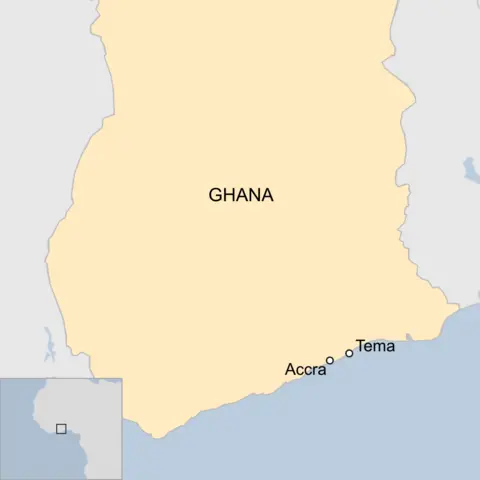

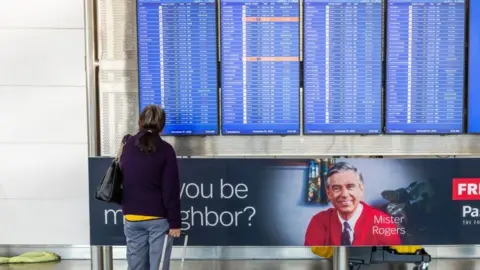 EPA/ Shutterstock
EPA/ ShutterstockFlight delays and cancellations continue to snarl US air travel for a third day as Transportation Secretary Sean Duffy warned air traffic will be "reduced to a trickle" if the US government shutdown continues.
Roughly 1,400 flights to, from, or within the US were cancelled and 2,700 delayed on Sunday morning, according to flight tracker FlightAware. The longest delays were reported in Newark, New Jersey – more than two hours on average.
In a hopeful sign, lawmakers are working on a possible deal to reach a compromise on government funding and end the shutdown, according to US media reports.
The Senate was scheduled to convene on Sunday in a rare weekend session.
Duffy warned the impacts on air travel will grow dire if they do not break the stalemate soon.
"You're going to see air travel be reduced to a trickle," he said on CNN on Sunday. He added that travellers trying to fly home for the Thanksgiving holiday later this month may not be able to get there.
"Many of them are not going to be able to get on an airplane, because there are not going to be that many flights that fly if this thing doesn't open back up," he said.
The Federal Aviation Administration (FAA) announced last week that it would be reducing air travel capacity by up to 6% this weekend and 10% by next weekend at 40 of the nation's busiest airports. The cuts do not apply to international flights, but some airlines may choose to also cancel some of those flights, the FAA said.
Air traffic controllers, who are not being paid during the shutdown, are reportedly fatigued and not coming to work, triggering the reductions in air traffic allowances.
Duffy said Defence Secretary Pete Hegseth offered to have military air traffic controllers step in to help but he declined the offer because they are not certified to direct air traffic at the civilian airports.
Altogether, hundreds of thousands of federal workers are not being paid since the Government ran out of money on 1 October. Food-assistance for low-income Americans also have been in limbo, with the administration agreeing to pay only half of monthly benefits.
Sunday marked the 40th day of the longest shutdown in history as Republicans and Democrats still have not agreed on a funding resolution to reopen the government.
Republicans and Democrats have blamed each other for causing the impasse and for the travel disruptions.
Democrats have refused to back any Republican spending plan unless money for health insurance subsidies be included, while Republicans want to provide funding for the without anything else attached.
President Donald Trump suggested over the weekend money should be sent directly to Americans to buy health insurance rather than to insurance companies.
Republican senators are working on a compromise package that could end the impasse with a vote to advance legislation possibly coming on Sunday.

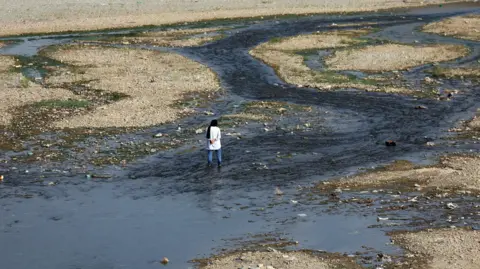 EPA
EPAIran - especially its capital, Tehran - is facing an unprecedented drought this autumn, with rainfall at record lows and reservoirs nearly empty. Officials are pleading with citizens to conserve water as the crisis deepens.
President Masoud Pezeshkian has warned that if there is not enough rainfall soon, Tehran's water supply could be rationed. But he said that even rationing might not be enough to prevent a disaster.
"If rationing doesn't work," Pezeshkian said, "we may have to evacuate Tehran."
His comments have prompted criticism in Iranian newspapers and on social media. Former Tehran mayor Gholamhossein Karbaschi called the idea "a joke" and said "evacuating Tehran makes no sense at all".
Iran's meteorological officials say no rainfall is expected over the next 10 days.
Meanwhile, the water crisis is already affecting daily life in the capital.
"I'm planning to buy water tankers to use for toilets and other necessities," a woman in Tehran told BBC Persian.
In the summer, Iranian rapper Vafa Ahmadpoor posted a video on social media showing a kitchen faucet with no running water.
"It's been four or five hours," he said. "I've bought bottled water just to be able to go to the toilet."
The manager of the Latian Dam, one of Tehran's main water sources, says it now holds less than 10% of its capacity. The nearby Karaj Dam — which supplies water to both Tehran and Alborz provinces — is in a similarly dire condition.
"I have never seen this dam so empty since I was born," an elderly local resident told Iranian state TV.
According to Mohammad-Ali Moallem, the manager of the Karaj Dam, rainfall has plummeted dramatically.
"We had a 92% decrease in rain compared to last year," he said. "We have only eight per cent water in our reservoir — and most of it is unusable and considered 'dead water.'"
The government is now pinning its hopes on late autumn rain, but forecasts are bleak. Iran's Minister of Energy, Abbas Ali Abadi, has warned the situation could soon force authorities to cut water supplies.
"Some nights we might decrease the water flow to zero," he said.
Officials have also announced plans to penalise households and businesses that consume excessive amounts of water.

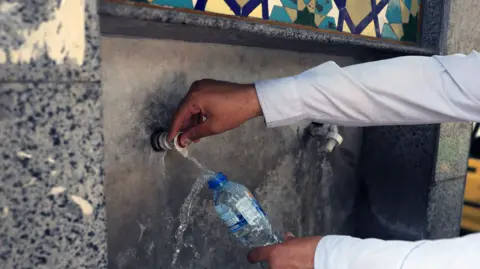 ABEDIN TAHERKENREH/EPA/Shutterstock
ABEDIN TAHERKENREH/EPA/ShutterstockIran's energy minister Ali Abadi has said Tehran's water crisis is not only due to a lack of rainfall. He blamed water leakage caused by the capital's century-old water infrastructure and even pointed to the recent 12-day war with Israel.
During that conflict, Israel targeted the northern Tehran neighbourhood of Tajrish on 15 June. Afterwards videos showed heavy flooding in the area.
The day after the strike, the Israel Defence Forces said it had targeted Iranian military "command centres".
But the crisis extends far beyond the capital.
The head of Iran's National Centre for Climate and Drought Crisis Management, Ahmad Vazifeh, has warned that, apart from Tehran, dams in many other provinces — including West Azerbaijan, East Azerbaijan and Markazi — are also in a "worrying state", with water levels in the single-digit percentages.
In Mashhad, Iran's second-largest city, officials are sounding the alarm as well.
The Governor of Khorasan Razavi Province in north-east Iran, said the water reserves in Mashhad's dams have dropped to "less than eight percent," warning that the province faces a "mega-challenge of drought."
CEO of Mashhad's Water and Wastewater Company put the figure even lower.
"The storage level of the city's main dam is below three percent," Hossein Esmaeilian said.
"Only three percent of the combined capacity of Mashhad's four water-supplying dams — Torogh, Kardeh, Doosti, and Ardak — remains. Apart from Doosti Dam, the other three are out of operation."
Iran's water crisis has been decades in the making.
Even Iran's Supreme Leader, Ayatollah Ali Khamenei, has repeatedly acknowledged the looming threat — speaking about water shortages in his Nowruz addresses in 2011 and on other occasions in the following years.
Yet little has changed.
Today, Tehran, Karaj and Mashhad — home to more than 16 million people combined — are facing the real possibility of their taps running dry.

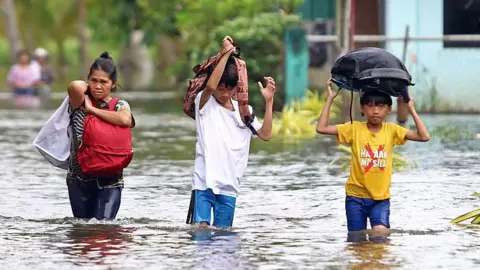 AFP via Getty Images
AFP via Getty ImagesThe Philippines is bracing for the arrival of another potentially devastating typhoon, less than a week after a different storm killed at least 200 people and left a trail of destruction.
Fung-wong, known locally as Uwan, is forecast to intensify to a super typhoon - with sustained winds of at least 185km/h (115mph) - before making landfall on the island of Luzon on Sunday evening local time at the earliest.
The Philippine meteorological service (Pagasa) says the storm will also bring heavy rain and the risk of life-threatening storm surges.
Several schools have either cancelled classes on Monday or moved them online, while Philippine Airlines has cancelled a number of local flights.
Typhoon Fung-wong is expected to weaken rapidly once it makes landfall but will likely remain a typhoon as it travels over Luzon.
Eastern parts of the Philippines have already begun experiencing heavy rains and winds, a Pagasa official said in a briefing on Saturday evening local time.
While much of the country is expected to be impacted, there are particular concerns about those areas that could take a direct hit - including the small island of Catanduanes, which lies off the coast of southern Luzon.
Residents there, as well as in other low-lying and coastal areas, have been urged to move to higher ground ahead of the storm's arrival.
A civil defence spokesman said evacuations had to be carried out by Sunday morning at the latest and should not be attempted during heavy rain and strong winds.
Typhoon Fung-wong has also forced the suspension of rescue operations following the passage of Kalmaegi, one of the strongest typhoons this year.
Heavy rainfall sent torrents of mud down hillsides and into residential areas. Some poorer neighbourhoods were obliterated by the fast-moving flash floods.
At least 204 people are now known to have died in the Philippines as a result of the earlier storm, while more than 100 are still missing.
Five people also died in Vietnam, where strong winds uprooted trees, tore off roofs, and smashed large windows.
The Philippines government declared a state of calamity across the country after Typhoon Kalmaegi and in preparation for the coming storm.
It has given government agencies more power to access emergency funds and fast-track the procurement and delivery of essential goods and services to those in need.
For some Filipinos, the devastation wrought by Typhoon Kalmaegi earlier this week has left them even more anxious about the storm to come.
"We decided to evacuate because the recent typhoon brought floods in our area, and now I just want to keep my family safe," Norlito Dugan told the AFP news agency.
He is among those who have taken shelter in a church in the city of Sorsogon in Luzon.
Another resident, Maxine Dugan said: "I'm here because the waves near my house are now huge, I live near the shore. The winds there are now very strong, and the waves are huge."
The Philippines is one of the most vulnerable countries in the world to tropical cyclones, due to its location on the Pacific Ocean where such weather systems form.
About 20 tropical cyclones form in that region every year, half of which impact the country directly.
Climate change is not thought to increase the number of hurricanes, typhoons and cyclones worldwide.
However, warmer oceans coupled with a warmer atmosphere - fuelled by climate change - have the potential to make those that do form even more intense. That can potentially lead to higher wind speeds, heavier rainfall, and a greater risk of coastal flooding.

 AFP via Getty Images
AFP via Getty ImagesThe Philippines is bracing for the arrival of another potentially devastating typhoon, less than a week after a different storm killed at least 200 people and left a trail of destruction.
Fung-wong, known locally as Uwan, is forecast to intensify to a super typhoon - with sustained winds of at least 185km/h (115mph) - before making landfall on the island of Luzon on Sunday evening local time at the earliest.
The Philippine meteorological service (Pagasa) says the storm will also bring heavy rain and the risk of life-threatening storm surges.
Several schools have either cancelled classes on Monday or moved them online, while Philippine Airlines has cancelled a number of local flights.
Typhoon Fung-wong is expected to weaken rapidly once it makes landfall but will likely remain a typhoon as it travels over Luzon.
Eastern parts of the Philippines have already begun experiencing heavy rains and winds, a Pagasa official said in a briefing on Saturday evening local time.
While much of the country is expected to be impacted, there are particular concerns about those areas that could take a direct hit - including the small island of Catanduanes, which lies off the coast of southern Luzon.
Residents there, as well as in other low-lying and coastal areas, have been urged to move to higher ground ahead of the storm's arrival.
A civil defence spokesman said evacuations had to be carried out by Sunday morning at the latest and should not be attempted during heavy rain and strong winds.
Typhoon Fung-wong has also forced the suspension of rescue operations following the passage of Kalmaegi, one of the strongest typhoons this year.
Heavy rainfall sent torrents of mud down hillsides and into residential areas. Some poorer neighbourhoods were obliterated by the fast-moving flash floods.
At least 204 people are now known to have died in the Philippines as a result of the earlier storm, while more than 100 are still missing.
Five people also died in Vietnam, where strong winds uprooted trees, tore off roofs, and smashed large windows.
The Philippines government declared a state of calamity across the country after Typhoon Kalmaegi and in preparation for the coming storm.
It has given government agencies more power to access emergency funds and fast-track the procurement and delivery of essential goods and services to those in need.
For some Filipinos, the devastation wrought by Typhoon Kalmaegi earlier this week has left them even more anxious about the storm to come.
"We decided to evacuate because the recent typhoon brought floods in our area, and now I just want to keep my family safe," Norlito Dugan told the AFP news agency.
He is among those who have taken shelter in a church in the city of Sorsogon in Luzon.
Another resident, Maxine Dugan said: "I'm here because the waves near my house are now huge, I live near the shore. The winds there are now very strong, and the waves are huge."
The Philippines is one of the most vulnerable countries in the world to tropical cyclones, due to its location on the Pacific Ocean where such weather systems form.
About 20 tropical cyclones form in that region every year, half of which impact the country directly.
Climate change is not thought to increase the number of hurricanes, typhoons and cyclones worldwide.
However, warmer oceans coupled with a warmer atmosphere - fuelled by climate change - have the potential to make those that do form even more intense. That can potentially lead to higher wind speeds, heavier rainfall, and a greater risk of coastal flooding.

 EPA
EPAIran - especially its capital, Tehran - is facing an unprecedented drought this autumn, with rainfall at record lows and reservoirs nearly empty. Officials are pleading with citizens to conserve water as the crisis deepens.
President Masoud Pezeshkian has warned that if there is not enough rainfall soon, Tehran's water supply could be rationed. But he said that even rationing might not be enough to prevent a disaster.
"If rationing doesn't work," Pezeshkian said, "we may have to evacuate Tehran."
His comments have prompted criticism in Iranian newspapers and on social media. Former Tehran mayor Gholamhossein Karbaschi called the idea "a joke" and said "evacuating Tehran makes no sense at all".
Iran's meteorological officials say no rainfall is expected over the next 10 days.
Meanwhile, the water crisis is already affecting daily life in the capital.
"I'm planning to buy water tankers to use for toilets and other necessities," a woman in Tehran told BBC Persian.
In the summer, Iranian rapper Vafa Ahmadpoor posted a video on social media showing a kitchen faucet with no running water.
"It's been four or five hours," he said. "I've bought bottled water just to be able to go to the toilet."
The manager of the Latian Dam, one of Tehran's main water sources, says it now holds less than 10% of its capacity. The nearby Karaj Dam — which supplies water to both Tehran and Alborz provinces — is in a similarly dire condition.
"I have never seen this dam so empty since I was born," an elderly local resident told Iranian state TV.
According to Mohammad-Ali Moallem, the manager of the Karaj Dam, rainfall has plummeted dramatically.
"We had a 92% decrease in rain compared to last year," he said. "We have only eight per cent water in our reservoir — and most of it is unusable and considered 'dead water.'"
The government is now pinning its hopes on late autumn rain, but forecasts are bleak. Iran's Minister of Energy, Abbas Ali Abadi, has warned the situation could soon force authorities to cut water supplies.
"Some nights we might decrease the water flow to zero," he said.
Officials have also announced plans to penalise households and businesses that consume excessive amounts of water.

 ABEDIN TAHERKENREH/EPA/Shutterstock
ABEDIN TAHERKENREH/EPA/ShutterstockIran's energy minister Ali Abadi has said Tehran's water crisis is not only due to a lack of rainfall. He blamed water leakage caused by the capital's century-old water infrastructure and even pointed to the recent 12-day war with Israel.
During that conflict, Israel targeted the northern Tehran neighbourhood of Tajrish on 15 June. Afterwards videos showed heavy flooding in the area.
The day after the strike, the Israel Defence Forces said it had targeted Iranian military "command centres".
But the crisis extends far beyond the capital.
The head of Iran's National Centre for Climate and Drought Crisis Management, Ahmad Vazifeh, has warned that, apart from Tehran, dams in many other provinces — including West Azerbaijan, East Azerbaijan and Markazi — are also in a "worrying state", with water levels in the single-digit percentages.
In Mashhad, Iran's second-largest city, officials are sounding the alarm as well.
The Governor of Khorasan Razavi Province in north-east Iran, said the water reserves in Mashhad's dams have dropped to "less than eight percent," warning that the province faces a "mega-challenge of drought."
CEO of Mashhad's Water and Wastewater Company put the figure even lower.
"The storage level of the city's main dam is below three percent," Hossein Esmaeilian said.
"Only three percent of the combined capacity of Mashhad's four water-supplying dams — Torogh, Kardeh, Doosti, and Ardak — remains. Apart from Doosti Dam, the other three are out of operation."
Iran's water crisis has been decades in the making.
Even Iran's Supreme Leader, Ayatollah Ali Khamenei, has repeatedly acknowledged the looming threat — speaking about water shortages in his Nowruz addresses in 2011 and on other occasions in the following years.
Yet little has changed.
Today, Tehran, Karaj and Mashhad — home to more than 16 million people combined — are facing the real possibility of their taps running dry.

 X
XProtesters targeted a new multi-million dollar museum in Nigeria and forced organisers to halt a preview event ahead of Tuesday's grand opening.
Videos showed a group insulting foreign guests and ordering them to leave after entering the grounds of the Museum of West African Art (Mowaa) in Benin City on Sunday.
The museum in Edo state was in part conceived as a home for the Benin Bronzes - artefacts looted from there by British soldiers in the 19th Century. The campus includes state-of-the art preservation and restoration facilities.
However, a bitter dispute over the control of the prized artworks has meant they are not at the museum, something that appeared to have angered the protesters.
All guests were safely escorted to secure locations, according to a statement from the museum.
"We sincerely apologise for any inconvenience this situation may have caused," Mowaa said.
A local resident told the BBC the frustration stems from what many see as a hijacking of an Edo project.
"The Benin Oba [king], traditional rulers and the government of Edo are not happy about it," the resident added.

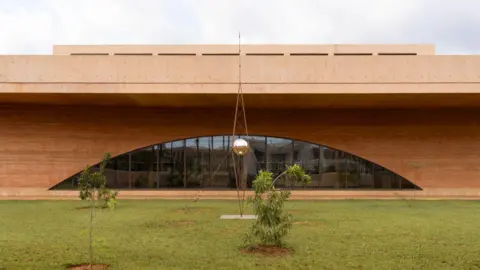 Museum of West African Art (MOWAA), Marco Cappelletti/Marco Cappelletti Studio
Museum of West African Art (MOWAA), Marco Cappelletti/Marco Cappelletti Studio"Edo" was initially in the museum's name, but this was later dropped. Executive director Phillip Ihenacho told the BBC the backers wanted the institution to serve a wider purpose beyond Nigeria.
In its statement, Mowaa said the protest "appeared to stem from disputes between the previous and current state administrations".
The museum emphasised it was an independent, non-profit organisation and, though a former state governor had backed the project, he had no interest in it "financial or otherwise".
Mowaa has now cancelled all preview events leading up to the opening and advised visitors to avoid the campus until the situation is resolved.
"We are deeply grateful to all our guests - many of whom travelled long distances to be here - for their understanding, patience and resilience," the statement said. "We sincerely apologise for any inconvenience this situation may have caused."

 Getty Images/BBC
Getty Images/BBCGo to BBCAfrica.com for more news from the African continent.
Follow us on Twitter @BBCAfrica, on Facebook at BBC Africa or on Instagram at bbcafrica

 Getty Images
Getty ImagesA British man has died after being shot during a robbery in Ghana on Friday, police say.
Ashraf Qarmar Parvez, 68, was shot after he tried to stop an attempt to steal his phone at a drinking spot in Tema, a city to the east of the Ghanaian capital, Accra. He later died in hospital, police said.
Authorities in Ghana are searching for the shooter - one of a group of six suspects who they say were at the scene and fled on motorbikes.
The BBC has contacted the UK Foreign Office for comment.
A 9mm spent bullet shell was recovered from the shooting site and police have interviewed witnesses as part of their investigation.
The incident has raised security concerns in the industrial city of Tema, but a local police spokesperson told the BBC that the shooting was a rare incident.
"Efforts are ongoing to contact the British Embassy to officially notify them of the death of their national," the police said in a statement.

